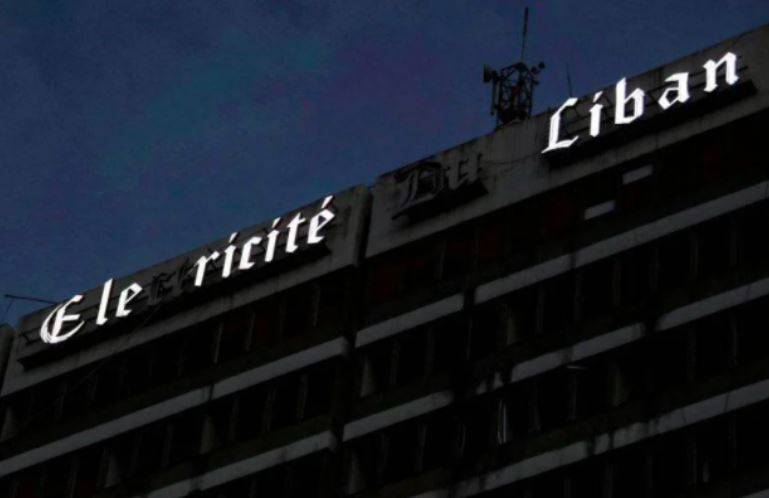
Electricité du Liban's headquarters in Beirut. (Credit: Anwar Amro/AFP)
Want to get the Morning Brief by email? Click here to sign up.
Caretaker Energy Minister Walid Fayad told reporters he “sensed” Iraqi “support” for extending a deal that supplies Lebanon with fuel for its power plants. In a press briefing following a meeting in Baghdad with his Iraqi counterpart, Ihsan Abdul-Jabbar Ismail, Fayad said he believes the extension would come “if the process secures benefits for both parties.” Meanwhile, Iraq’s Finance Minister Ali Allawi expressed “willingness to look into the potential extension of the [Iraqi fuel] deal and upgrading it to secure a sustainable process that benefits both parties when it comes to [the fuel deal’s] size and its ability to fund its need for fuel through facilitated terms, or a trade agreement, or both choices at the same time,” according to Fayad. Lebanon signed a deal with Iraq in July 2021 in which Lebanon was to obtain 1 million tons of high sulfur fuel oil from Iraq over the next year, which would then be swapped for fuel that is compatible with Lebanon’s plants — the Iraqi fuel oil is not — and could be used to generate power. Iraq would receive the payments, which could be deferred by up to a year, in Lebanese lira at the central bank’s Sayrafa rate and could then use the funds to buy“goods and services” from Lebanon. The deal, which expires in September, has been the main source of fuel for Lebanon’s beleaguered state electricity company.
Hundreds marched yesterday from the Energy Ministry in Corniche al-Nahr to downtown Beirut to protest electricity shortages and telecoms price hikes. Along the way protesters banged on the doors of the Association of Banks in Lebanon and chanted outside the offices of MTC Touch. Demonstrators also gathered in front of MTC Touch’s offices in Tripoli and Baalbek to protest the sharp rise in telecom tariffs. The new telecom prices are calculated as a third of the original dollar rates — which were previously paid in lira at the official exchange rate of LL1,507 — multiplied by the Sayrafa rate, currently set at LL25,300. Caretaker Telecoms Minister Johnny Corm told a session of the parliamentary Media and Communications Committee on Monday that there was “no other possibility” to save the sector from collapse.
Presidential hopefuls have been taking to the air to make their cases. Lebanese Forces leader Samir Geagea made a pitch for himself as president on Monday, saying if he is elected “everything will change.” Calling himself a “natural candidate” for the position, he said the most important step is to “unify” all of the non-March 8 parliamentary factions to prevent the election of another president close to the March 8 coalition, which includes Hezbollah, Amal and President Michel Aoun’s Free Patriotic Movement among others. Also Tuesday, another presidential hopeful, FPM leader Gebran Bassil, gave a press conference in which he called for presidential elections to be held on time in October. The new parliament has proven exceptionally fragmented, which could foreshadow a tight presidential race. Parliament Speaker Nabih Berri was re-elected to the post last month with just 65 votes out of the 128-member legislature, and Elias Bou Saab snagged the deputy speaker seat with 65 votes as well. Najib Mikati was re-designated to form the new government the week before last with just 54 votes. Despite talk of a “new majority” in parliament following the elections, so far there appears to be little chance of a strong majority of MPs agreeing on anything.
A retired soldier suspected of multiple instances of rape and child molestation was arrested in a Bekaa village on Tuesday. The suspect, in his 50s, allegedly assaulted and raped several children in al-Qaa near the Syrian border. The case came to light when one of the children told his parents about the attack, prompting several other victims to come forward. The municipality of al-Qaa has pledged psychological support to the victims and the mayor insisted that the suspect will not benefit from “any political protection” in the case. A security source confirmed to L’Orient Today’s correspondent in the area that the suspect was a retired soldier, but the Lebanese Army has yet to make an official statement regarding the case.
French President Emmanuel Macron and Israeli Prime Minister Yair Lapid discussed Lebanon on Tuesday during Lapid’s visit to Paris to voice Israeli opposition to a new nuclear deal between Iran and Western states. Before leaving for France, Lapid had told reporters he wanted Macron to “intervene” in maritime border negotiations between Lebanon and Israel. Macron reportedly gave a non-committal answer, saying, “The two countries have an interest in reaching an agreement which will allow energy exploitation for the benefit of the two peoples,” but it is not clear what steps, if any, Macron agreed to take. Lapid also reportedly used the meeting to call for a tougher Lebanese government stance against Hezbollah, saying before his departure, "The Lebanese government must control Hezbollah or we will be forced to do so." Macron, who favors a nuclear deal with Iran, called for “stronger negotiations on … [Iran’s] regional activities.” Hezbollah sent three unarmed drones in the direction of the disputed Karish gas field on Saturday, drawing a rebuke from Prime Minister-designate Najib Mikati and caretaker foreign minister Abdallah Bou Habib.
In case you missed it, here’s our must-read story from yesterday: “Who are the opposition voters? It’s complicated”